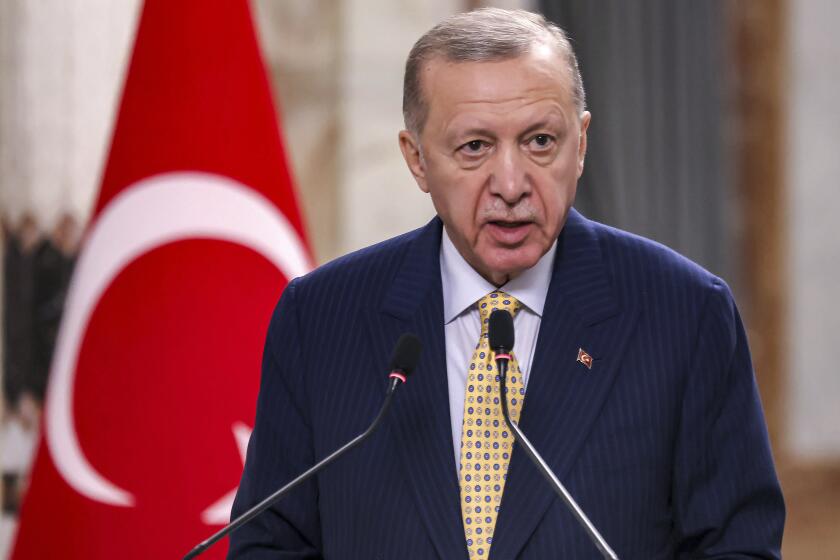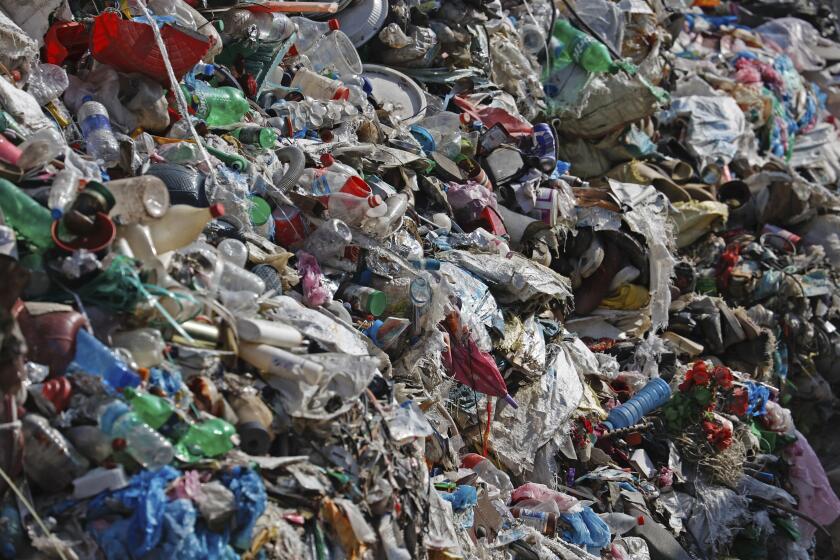Lebanon’s Lahoud: Last Man Standing
He weathered demands for his resignation, shrugged off the insults and outlasted the Syrian protectors who were regarded as his sole source of clout.
Through it all, Lebanon’s seemingly unsinkable president, Emile Lahoud, has managed to hold on to his job. He has ridden out waves of tumult, bombings and street demonstrations. He stayed put while the political fortunes of virtually everybody in Lebanon’s ruling class shifted.
While billionaire businessman Saad Hariri celebrated his anti-Syria bloc’s sweep in the final phase of parliamentary elections Monday, Lahoud stayed out of sight. And the question grew: What will become of Lebanon’s deeply unpopular president, a staunch ally of Damascus who is widely seen as a symbol of the Syrian government?
At a time when this battle-scarred country is assembling its first independent government after nearly three decades of civil war and Syrian domination, Lahoud, 69, stands as a reminder of all that has not changed. Syria has relinquished overt control. The pro-Syria government has fallen. But Lahoud endures.
In the end, the same byzantine religious frictions that have shadowed Lebanon for centuries are also his best chance to stay in power. In recent weeks, Lahoud has sought shelter from Christians who, though not happy with his politics, are leery of allowing one of their own to be bullied out of office by Muslim and Druze foes.
Hariri, the 35-year-old son of assassinated former Prime Minister Rafik Hariri, has in the past called for Lahoud’s ouster. Many anti-Syria politicians consider Lahoud proof of Syria’s lingering influence, and want to drive him out of office.
“President Lahoud is one of the main symbols of the [Syrian] military-security regime, and we’ll do whatever we can not to let him continue,” said Naila Mouwad, a Hariri-backed Christian lawmaker who was reelected in Sunday’s voting. “We cannot speak about a sovereign Lebanon as long as he is in power.”
The bombing that killed Rafik Hariri, a popular Sunni Muslim leader, was widely blamed on Syria. Although Damascus denied involvement, international pressure and street demonstrations forced Syrian President Bashar Assad to withdraw the country’s troops from Lebanon.
However, the crisis between the Syrian government and formerly compliant members of the Lebanese elite started months earlier, and Lahoud was the focal point. Syria was determined to keep Lahoud as president beyond his term, which expired in October. Damascus pressured Lebanese legislators into amending the constitution to give him another three years in office.
Hariri resigned in protest, and told friends he’d been threatened by Assad during a trip to Damascus. Druze leader Walid Jumblatt was enraged. Christians had long been critical of the Syrians, but now the Druze and the Sunnis allied against Damascus.
There are several theories why Syria was so determined to keep Lahoud in office, but no convincing explanation. Maybe Assad wanted to keep a trusted ally in place, and underestimated the damage it would cause. Or perhaps, as some Lebanese and Syrian sources have claimed, Lahoud had become enmeshed in lucrative business deals with members of the Syrian government.
Lahoud is a general and the son of a general and grew up in the verdant hills cupping Beirut.
In 1989, as Lebanon’s 15-year civil war reached its final stages, Lahoud was named commander of the armed forces. During those delicate years, the braiding of warring religious factions into a coherent fighting force was one of the main challenges. Lahoud managed to integrate the foot soldiers into mixed units. To this day, the Lebanese army is considered a success story.
“It was something Lebanon needed, but nobody dared to do,” said Timur Goksel, a former chief advisor to the United Nations who teaches conflict management at the American University of Beirut. “He put together a nonsectarian army. Nobody accused him of being from this side or that side. The Syrian label didn’t come until later.”
Something else had happened in those years: Lahoud befriended Bashar Assad, who was soon to take over the presidency from his father, Hafez. The younger Assad, a shy eye doctor, had been yanked home from London to be groomed for the presidency after his older brother, Basil, was killed in a car crash in 1994.
Assad was being trained in a military academy in Aleppo at a time when Lahoud was taking Lebanese officers there for training.
In 1998, Lahoud ascended to president, vetted by Damascus. He clashed from the beginning with Rafik Hariri, and the two men blocked each other’s projects. Even in a nation rife with epic frictions, the feud between the men stands as one of its great political rivalries.
The younger Hariri seems to have inherited his father’s rivalry. At the beginning of the elections, he said, “We’re trying to get rid of this guy.”
Later, when asked about how Lahoud would regard the voting, he replied coldly: “I think he sees it gloomily. And I would like to see it in his eyes.”
The elder Hariri’s slaying provoked calls for Lahoud’s resignation, but the president ignored them. The calls swelled again after outspoken anti-Syria journalist Samir Kassir was slain in Beirut this month.
Lahoud has remained defiant. He told reporters that he would stay in office “until the last minute of my term.”
Although Hariri’s anti-Syria bloc won enough seats to control parliament, it did not garner the two-thirds needed to remove the president. When Hariri appeared before supporters Monday, he demurred from discussing Lahoud’s fate.
Meanwhile, the Maronite Christian patriarch, Nasrallah Sfeir, has come to Lahoud’s defense. Analysts say many Christians are nervous about their future as a minority group in a nation dominated by Muslims, and reluctant to depose a Christian leader.
“In local ethos and context, this is a Maronite seat,” said Jamil Mroue, publisher of the Daily Star newspaper. “You don’t have a Druze leader, no matter what he thinks of himself, ordering our man out. It’s a question of defending the post, not the man sitting in it.”
Hezbollah, the powerful Shiite Muslim political party and militia, has said it would not support moves to remove Lahoud.
Popular Christian leader Gen. Michel Aoun has discouraged talk of unseating Lahoud. But in an interview Sunday, he also suggested that parliament should look for an “honorable exit” for the president. He also said he might succeed Lahoud.
“We are waiting to finish the election, then prepare his departure. Nobody can oblige him to resign,” Aoun said.
Even Christians on the street dismiss Lahoud as a tool of the Syrians.
“Lahoud is like a man in a wheelchair, and Syria would carry him from place to place,” said 65-year-old Farid Helou, who owns a small grocery store near the presidential palace.
“He doesn’t have anybody behind him,” added Helou’s nephew, Faris Helou, a 38-year-old interior decorator. “Nobody voted for him or wanted him. It was like one day we woke up and he was president again.”
Nevertheless, the men bridle at the calls for Lahoud’s removal.
“He’s a Christian man,” the elder Helou said. “If they were going to remove the [Sunni] prime minister or the [Shiite] speaker, their communities would be up in arms.
“Why are they trying to remove the only leader who represents us?”
More to Read
Sign up for Essential California
The most important California stories and recommendations in your inbox every morning.
You may occasionally receive promotional content from the Los Angeles Times.









